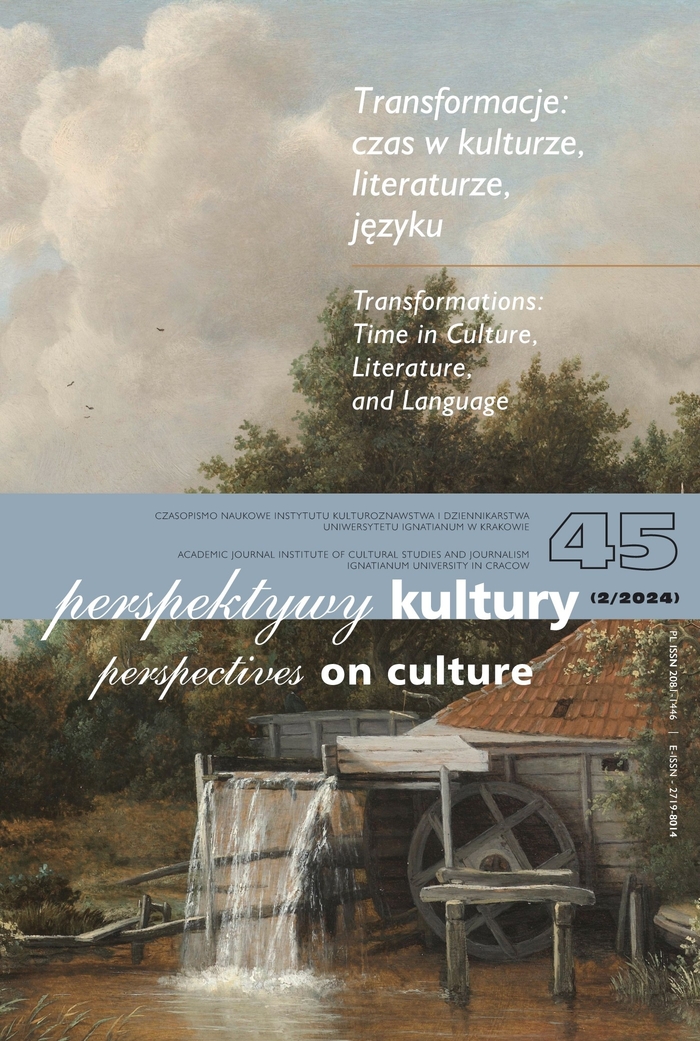Prosochê and the Transformation of the Self in Geoffrey Chaucer’s Poetry
Abstract
The article deals with the concept of prosochê, defined as concentration on the present moment, in Geoffrey Chaucer’s poetry. Even though the Greek term never appears in Chaucer’s poetry, the idea of attentive reflection on the self, others, and the cosmos is often articulated by the poet, especially in his courtly poetry, which construes individuals as steeped in apathy and in need of inner transformation. The poet underlines the transformative power of attention through a call to wake up, examples of which will be examined in this article, based on two poems: The Book of the Duchess and Troilus and Criseyde. It will be shown that Chaucer’s engagement with the concept of prosochê is testament to the poet’s creativity while handling his sources as well as to his moral sensitivity and philosophical reflection.
References
Adler, G. (2022). Chaucer and the Ethics of Time. Cardiff: University of Wales Press.
Astell, A. W. (1994). Job, Boethius, and Epic Truth. Ithaca and London: Cornell University Press.
Bennett, J. A. W. (1982). Nosce Te Ipsum: Some Medieval and Modern Interpretations. In: Piero Boitani (ed.), The Humane Medievalist and Other Essays in English Literature and Learning, from Chaucer to Eliot. Roma: Edizioni di Storia e Letteratura, 135–172.
Benson, L. D. (ed.) (1988). The Riverside Chaucer. Oxford: Oxford University Press.
Burnley, J. D. (1979). Chaucer’s Language and the Philosophers’ Tradition. Cambridge: D. S. Brewer; Totowa: Rowman & Littlefield.
Christie, D. E. (2012). The Blue Sapphire of the Mind. Oxford: Oxford University Press.
https://doi.org/10.1093/acprof:oso/9780199812325.001.0001.
DeMarco, P. (2008). Violence, Law, and Ciceronian Ethics in Chaucer’s Tale of Melibee. Studies in the Age of Chaucer 30, 125–169. https://doi.org/10.1353/sac.0.0027.
Eldridge, R. (2009). Introduction. In R. Eldridge (ed.), The Oxford Handbook of Philosophy and Literature. Oxford: Oxford University Press, 3–16. https://doi.org/10.1093/oxfordhb/9780195182637.003.0001.
Epictetus. (1983). Handbook of Epictetus, trans. by Nicholas White. Indianapolis, IN: Hackett Publishing Company.
Fumo, J. C. (2015). Making Chaucer’s Book of the Duchess. Textuality and Reception. Cardiff: University of Wales Press.
Gilbert, J. (2011). Living Death in Medieval French and English Literature. Cambridge: Cambridge University Press.
Hadot, P. (1995). Philosophy as a Way of Life. Spiritual Exercises from Socrates to Foucault, ed. with an introduction by Arnold I. Davidson; trans. by Michael Chase. Oxford, UK, and Cambridge, USA: Blackwell.
Heffernan, C. F. (1990). Chaucer’s Troilus and Criseyde: The Disease of Love and Courtly Love. Neophilologus, vol. 74, 294–309. https://doi.org/10.1007/BF00310540.
Kotva, S. (2020). Effort and Grace: On the Spiritual Exercise of Philosophy. London; New York: Bloomsbury.
Lehman, J. S. (2012). Lady Philosophy as Physician. In: Boethius, Consolation of Philosophy, ed. and trans. by Scott Goins and Barbara H. Wyman. Ignatius Critical Editions. San Francisco: Ignatius Press, 187–212.
Lynch, K. L. (2000). Chaucer’s Philosophical Vision. Cambridge: D. S. Brewer.
Miller, R. P. (ed.) (1977). Chaucer. Sources and Backgrounds. New York: Oxford University Press.
Mogan, J. J. (1969). Chaucer and the Theme of Mutability. The Hague, Paris: Mouton.
Murton, M. (2016). Secular Consolation in Chaucer’s Complaint of Mars. Studies in the Age of Chaucer 38, 75–107. https://doi.org/10.1353/sac.2016.0002.
Phillips, H. (1997). The Book of the Duchess. Introduction. In: H. Phillips and N. Havely (eds.), Chaucer’s Dream Poetry. London and New York: Longman, 29–49.
Pigliucci, M. (2022). Prosochê as Stoic Mindfulness. In: R. Repetti (ed.), Routledge Handbook on the Philosophy of Meditation. Routledge, Taylor & Francis Group, 371–382.
https://www.routledgehandbooks.com/doi/10.4324/9781003127253-31.
Rosenfeld, J. (2013). Ethics and Enjoyment in Late Medieval Poetry. Love after Aristotle. Cambridge: Cambridge University Press.
Seneca. (2007). Dialogues and Essays, trans. by J. Davie. Oxford: Oxford University Press.
Seneca. (2021). Moral Letters to Lucilius, vol. I, II, III, trans. by R. M. Gummere. London: William Heinemann.
Sherman, N. (2021). Stoic Wisdom: Ancient Lessons for Modern Resilience. Oxford: Oxford University Press.
Shimomura, S. (2013). The Walking Dead in Chaucer’s Knight’s Tale. The Chaucer Review, vol. 48, no. 1, 1–37. https://doi.org/10.5325/chaucerrev.48.1.0001.
Tran, D. Q. (2021). Attention, Reverence, and Devotion. In: S. K. Dhiman (ed.), The Routledge Companion to Mindfulness at Work. London and New York: Routledge, 463–478.
https://www.routledgehandbooks.com/doi/10.4324/9780429244667-27.
Wack, M. (1986). Pandarus, Poetry, and Healing. Studies in the Age of Chaucer, vol. 1986, no. 1, 127–133. https://doi.org/10.1353/sac.1986.0061.
Wynne-Davies, M. (ed.) (1995). The Bloomsbury Guide to English Literature. London: Bloomsbury Publishing Place.
Copyright (c) 2024 Perspectives on Culture

This work is licensed under a Creative Commons Attribution-NoDerivatives 4.0 International License.
Autor, zgłaszając swój artykuł, wyraża zgodę na korzystanie przez Wydawnictwo Uniwersystet Ignatianum z utworu na następujących polach eksploatacji:
- utrwalania utworu w formie papierowej, a także na nośniku cyfrowym lub magnetycznym;
- zwielokrotnienia utworu dowolną techniką, bez ograniczenia ilości wydań i liczby egzemplarzy;
- rozpowszechniania utworu i jego zwielokrotnionych egzemplarzy na jakimkolwiek nośniku, w tym wprowadzenia do obrotu, sprzedaży, użyczenia, najmu;
- wprowadzenia utworu do pamięci komputera;
- rozpowszechniania utworu w sieciach informatycznych, w tym w sieci Internet;
- publicznego wykonania, wystawienia, wyświetlenia, odtworzenia oraz nadawania i reemitowania, a także publicznego udostępniania utworu w taki sposób, aby każdy mógł mieć do niego dostęp w miejscu i czasie przez siebie wybranym.
Wydawca zobowiązuje się szanować osobiste prawa autorskie do utworu.





